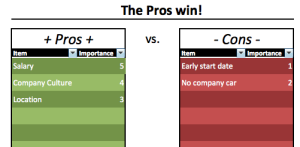One of the hardest things in life is making a crucial decision. Choosing a school, location, job, or spouse can be stressful. But, if you have strategies to help you make a decision, then you can save yourself from sleepless nights and regret.
I made a big decision a couple of months ago when I chose between multiple job offers. The decision was tough. I knew it carried life-altering effects, but I’m confident I made the right choice because of the process I used.
Pros-Cons List
You can also think of this as a risk-reward list, but a pros-cons list can be helpful in the initial stages of making a decision. This list is great for slowing the process down to flesh out each individual aspect of a decision in one place. If you make a separate pros-cons list for each option, then you can get a quick understanding and be off to a good start.
I used a pros-cons list to get out all the thoughts about each job offer on paper. But, I needed other decision-making tips to work towards a final decision. In my experience, a pros-cons list is almost never enough to come to a conclusion.
Also, I didn’t feel that my decision had any long-term definite risks for my future. I believed that I would be successful no matter what job I pick, so that helped to relieve pressure and look at what offer was the best fit for me right now.
Act Like You’re Advising A Friend
Everyone has experienced that time when they tried to tell their friend that the person they’re dating isn’t right for them. It seems obvious to you as the bystander, but your friend is emotional and can’t think logically.
That’s why an excellent tip to making a decision is to act like you’re advising a friend. Thinking in this mindset will free you to think rationally and leave emotional biases to the side. When I did this in my decision process, I was able to narrow it down to two job offers.
Seek Wisdom From People You Trust
To ensure that you’re not making a rash decision, it’s important to ask for the opinions of your immediate family and close friends. They often want the best for you and can get you to think about things you may not have considered. But, avoid seeking out more than ten people, because you don’t want to receive too much feedback and become overwhelmed.
Also, I have to say, you need to look out for emotional bias from those who are close to you. For example, your mom might base her advice only on her selfish desire to be in the same location together. Ultimately, you need to make the decision that’s best for your future.
Although my family and friends didn’t know all the aspects of each decision, it was valuable to hear their opinions on which job offer I should take. The questions they asked that made me think in a different perspective were their most important contribution.
Seek Wisdom From The Public
While it’s important to get advice from those you trust, it also can be really helpful to seek the general public’s view on your options. Just as you look at Amazon’s rating for a product or Yelp’s review of a restaurant, you can look at another website’s ratings of your specific options.
For example, if you want to move to a new location, there are reviews of thousands of cities from people who have lived there. Use those to gauge the overall vibe about that city. Look at the specific language and find what seems to be the main things people rave and complain about.
Back to my decision, I looked at reviews of all the companies on glassdoor.com, a site that collects feedback from current and former workers at individual companies. Instantly, I had access to hundreds of people’s ratings and positive or negative comments about the company. I focused on the reviews from two to four star ratings, because those gave more thought to their commentary. The really pissed off or really happy employees usually gave a one- or five-star rating with little valuable feedback.
Final Thoughts
The more experiences you have with decision-making, the better you will be. If you want to be excellent, you can practice going through this process on small- to medium-size decisions, and then you will be prepared for the next major decision.
If you have any advice of your own on making decisions, then comment below. I’ll respond to all comments.



